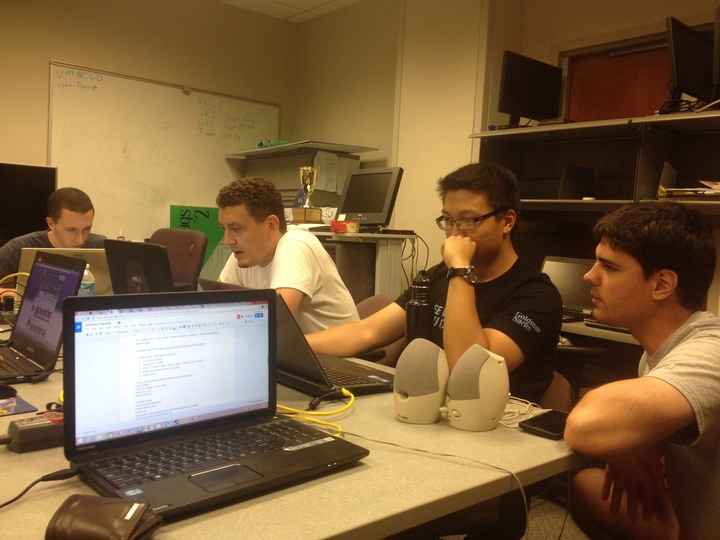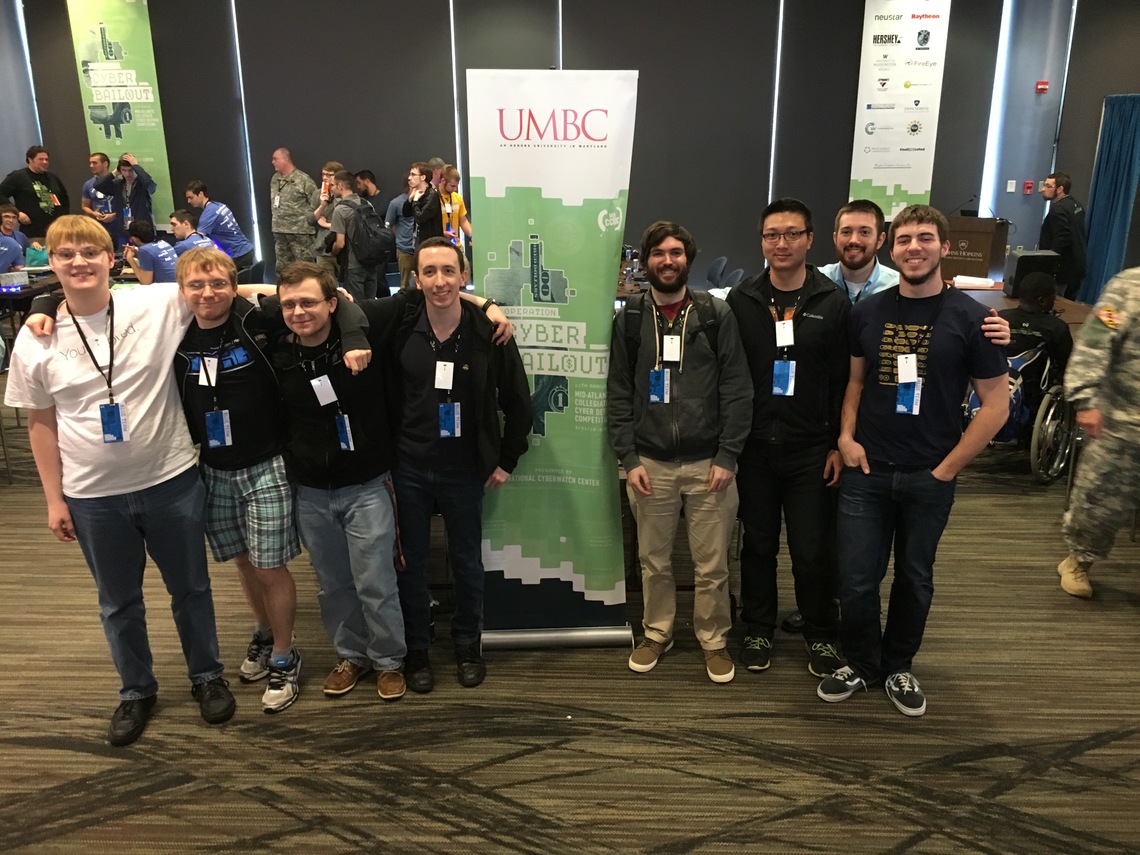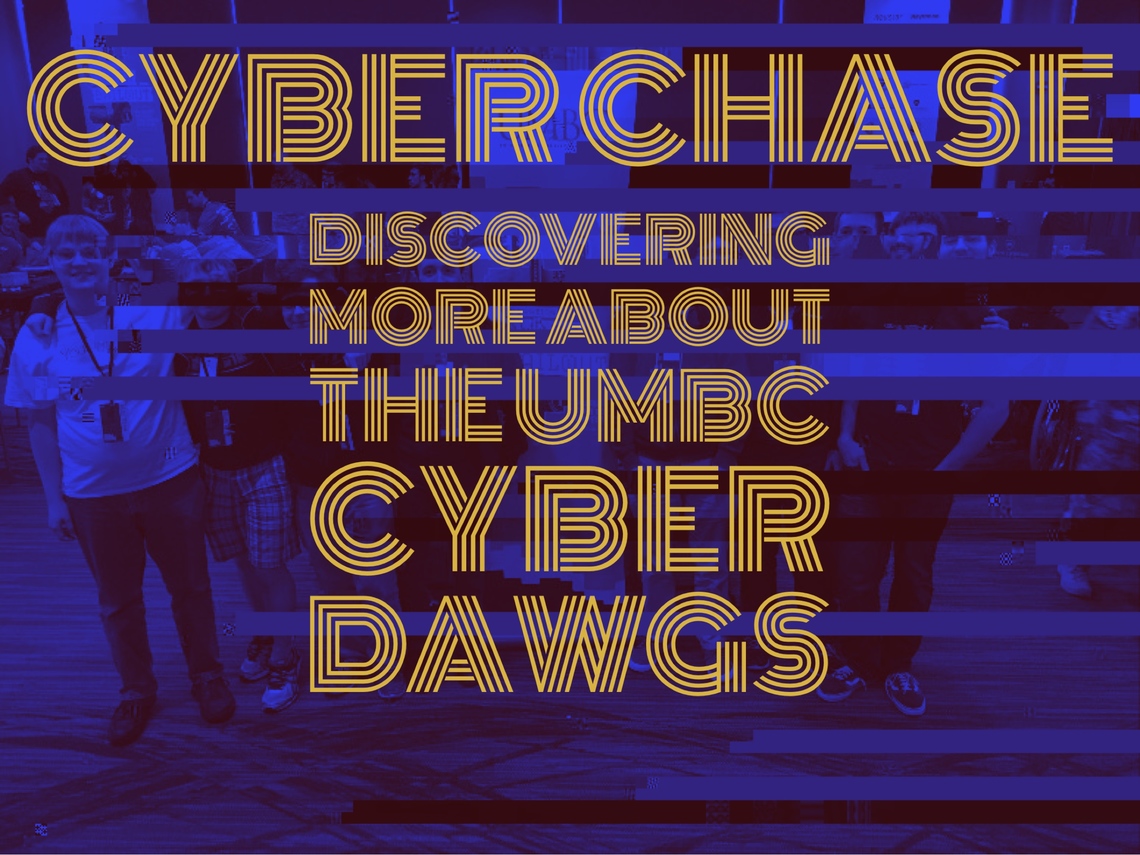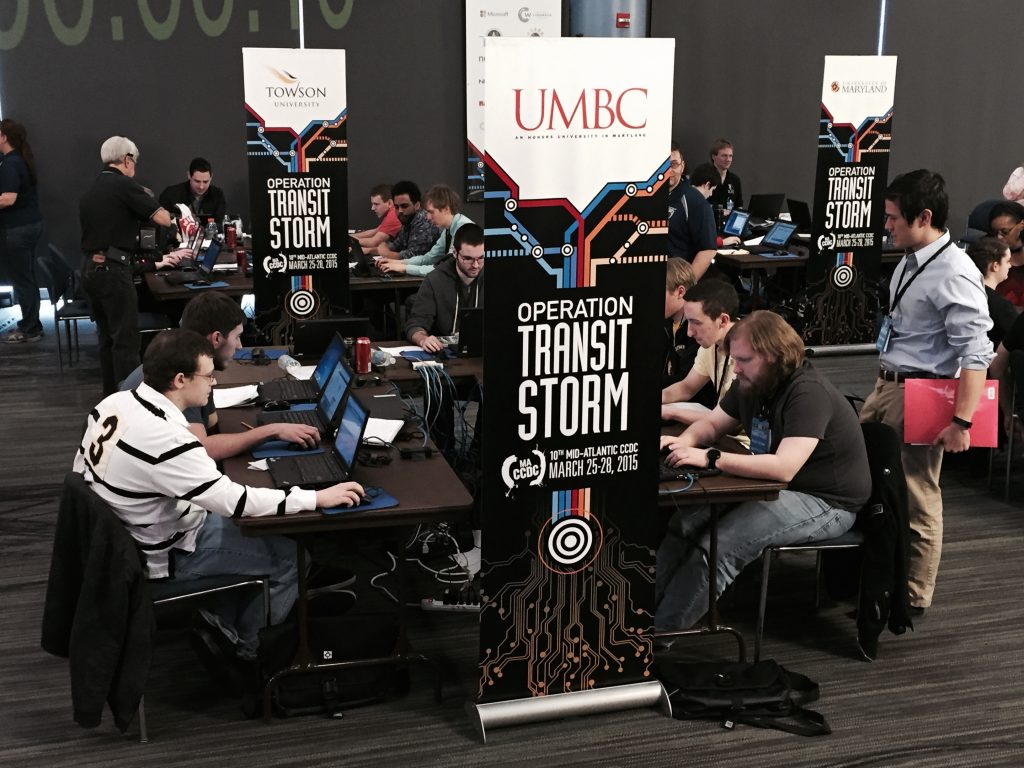Cyber Chase: the UMBC Cyber Dawgs
In 2009 a small group took shape at UMBC. A student-run club composed of individuals who shared one common interest: computer and network security. They would meet weekly and discuss the latest cyber-security topics happening and even compete at a national security event, known as the Collegiate Cyber Defense Competition (CCDC). Officially, the UMBC Cyber Defense Team was born, but the group would also come to be known as the UMBC Cyber Dawgs.
Founding member Jorge Teixeira recounted what the early days of the UMBC Cyber Defense Team were like. “The idea started from Jeff Miller, who talked to Prof. John Pinkston,” said Teixeira, “I was sitting in [his lab] when they met to scout for a meeting room/lab.” At the time, Teixeira had done some security research for his MS and had a networking background and wanted to help Miller on what he could.
“We wanted to become an official SGA org but there was a lot of bureaucracy and delays involved, so that didn’t happen right away.” said Teixeira. In Fall 2010, the group competed in CCDC qualifications and went to regionals in mid Spring 2010, boosting the popularity of the group and finally becoming recognized by the SGA by late Fall 2010.
Teixeira also revealed the origins of the name Cyber Dawgs. “The name was coined by Dr. Nicholas in one of our early meetings with him, but the official name was and is UMBC Cyber Defense Team.” Said Teixeira.
“There are no limitations whatsoever with this group.”
Today, the Cyber Dawgs are still around and continue to compete at competitions like the CCDC. They have two faculty advisors, Dr. Charles Nicholas and Dr. Richard Forno, who take a hands off approach to let the club be student run. However, they do help with the logistics of the club and help provide necessary resources.
Bryan Vanek, Computer Science major and Cyber Dawgs club President, runs the day to day operations. While the majority of the group consists of STEM majors, Vanek doesn’t want the Cyber Dawgs to be limited to just people in the security or the computer science field. He actively encourages anyone who has an interest in some area of cybersecurity and a willingness to learn to join the group. “There are no limitations whatsoever with this group.” Vanek said, “We’ll be more than happy to help you along the way!”
Preparing for the yearly CCDC competition is a huge undertaking. The competition focuses on aspects of information assurance and system security, where teams are given a commercial system that they need to protect. In order to do this, security checklists are looked over and good security practices, such as firewall rules and permissions are implemented.
During the competition, a ‘red team’ will attack their system in order to compromise it. Cyber Dawgs have to react in real time, not only trying to close off their connection but cleaning up any damage the red team has done to prevent it from happening again. They have to achieve all of this while keeping any and all required services of that system up.
This year, the Cyber Dawgs placed fourth at regionals and the year before that they received first place at regionals, which let them move on to the national competition in Texas where they placed fourth overall.
“As long as people have a desire to learn security, we will be there to support them.”
Anh Ho, a junior Computer Science major and Vice President of Cyber Dawgs, helps plan meetings and events in addition to helping other club members prepare technically for competitions. It’s his 4th year in the club and will be his 3rd year competing. He also helps avoid some of the pitfalls they’ve had in the past when dealing with both club and competition logistics. “These can be simple logistical oversights such as failure to request T-Shirts from SGA [to] technical configurations and what we should do the following year to learn from our mistakes.” said Ho.
He also shares Vanek’s passion in supporting people who take an interest in security. “As long as people have a desire to learn security, we will be there to support them.” said Ho.
Other competitions include cyber Capture the Flags (CTFs). These events can last anywhere between a day or a week with a focus on cyber security as a whole. Some CTFs are more focused on red team activities, such as a reverse engineering and web exploitation. Other CTFs focus on defensive mechanics, like analyzing forensic data and implementing strong security practices on servers.

This is the lab where the Cyber Dawgs use to practice for competitions. From left to right: Julio Valcarcel, Anthony Sasadeusz, Anh Ho, Jorge Teixeira.
Recently, the group participated in UMD’s Cyber Skyline CTF and Booz Allen Hamilton’s Kaizen CTF. “In these competitions, we usually do pretty well,” said Vanek, “we received first place either by an individual or by a team.”
“One of our other missions is to spread the word about how awesome the world of cyber security is…”
The Cyber Dawgs aren’t strictly about competitions. Vanek said, “If we just did [competitions] a lot of new people would get deterred. Thus one of our other missions is to spread the word about how awesome the world of cyber security is by teaching others in whatever way we can.”
During regular club meetings, the group has a large selection of activities that people can choose from to learn more about cyber security. These activities change depending on the semester, so in the Fall the activities are focused more on prepping for CTFs while the Spring semester focuses on CCDC by setting up servers and learning about firewall rules.
Christian Beam, a junior studying Computer Science and serving as club treasurer mentioned how not all meetings are just preparing for competitions. “Some meetings we have guest speakers from the industry to give talks about topics such as reverse engineering, or cryptography.” said Beam.

This image is from a tech talk with the consulting firm Booz Allen Hamilton. After the meeting, the firm networked with attendees and even accepted resumes for internship and job positions.
The Cyber Dawgs try to reach as many people as possible, whether that involves letting people know about their club meetings through their list serve or attending involvement fest and networking with other groups and clubs that share an interest in cyber security. They reach out to groups like the UMBC Cyber Scholars group to let them know about meetings and encouraging them to get involved.
Chris Gardner joined the Cyber Dawgs in his freshmen year at UMBC in 2014. “I’ve been interested in cyber security for a few years now and was the president of my high school’s security club, so joining the Cyber Dawgs seemed like a natural progression.” said Gardner.
He now helps lead the group in cyber CTFs and has learned a lot about cyber security since he’s been with the group.
The Cyber Dawgs are now working on quite a few projects for the upcoming school year. They plan to update their website with new tools and resources for current and future members. In addition to that, they plan on getting a coach for the CCDC to help them in structure and to show their weak points.
“…great way to give people who are new to cyber security another way to learn.”
In the future, the group wants to host their own CTF event right at UMBC. Vanek said, “This is not only a fun project that we’ve been wanting to do for a while, but it will be a great way to give people who are new to cyber security another way to learn.”
Vanek is proud to be president of the Cyber Dawgs, and is looking forward to all their goals and future as an organization. “I can’t begin to thank everyone enough for all that I’ve learned so far from our experiences together,” Vanek said, “and I truly look forward to what we’re all going to be able to accomplish together in these next few years.”

From left to right: Zack Orndorff, Chris Gardner, Josh Domangue, Julio Valcarcel, Jake Rust, Anh Ho, Christian Beam, Tyler Campbell
For more information, you can check out the Cyber Dawgs through their website.
The Cyber Dawgs send out most of their information through the use of their list server. Just send an email to umbccd-subscribe @lists.umbc.edu using your UMBC email address.
You can also chat with members as well by joining their slack channel using for your UMBC email.
Posted: June 7, 2016, 3:20 PM

